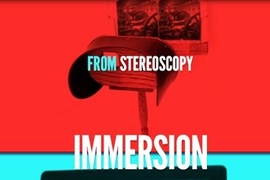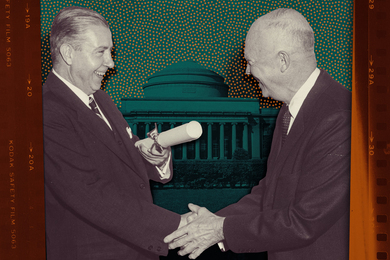The man who has called his leaking of secret government documents an act of “civil disobedience” has taken part in an MIT Media Lab symposium called Forbidden Research, about disobedience for social good.
Former National Security Agency (NSA) contractor, turned whistleblower, and current board member of the Freedom of the Press Foundation Edward Snowden appeared via video in the July 21 event. He’s been living outside the U.S. since 2013, when he leaked highly-classified NSA documents detailing government surveillance programs. The U.S. Department of Justice charged him with theft and espionage.
Snowden and author/hardware hacker Andrew “bunnie” Huang led the symposium’s opening session, Against the Law: Countering Lawful Abuses of Digital Surveillance. “Law is no substitute for conscience,” Snowden said. “This is not to say laws are bad, this is not to say we don’t want new rules. But there are better guarantees, which can provide greater enforcement of individual rights. Lawful abuse is not a contradiction.”
Just before Snowden spoke, he and Huang published a joint paper on their work developing technology to help journalists protect their smartphones from being traced and compromised through their radio hardware. The “introspection engine” would monitor a device’s radio activity using a measurement tool in a phone-mounted battery case. Huang, a plaintiff in a First Amendment lawsuit filed the morning of the event, said the basic challenge of the project was how to turn a smartphone into a cyber fortress. “Think of it as a designated driver for the phone. Journalists shouldn’t have to be cryptographers to be safe. I want them to be able to go and meet with their sources, leave the fortress if they have to, and not have to worry about their phones being a vector for their capture.”
Challenges in change
Technology as a tool for change continued in the symposium’s next two sessions, called Messing with Nature. Part 1 focused on genetics at a time when the relatively new gene editing system CRISPR is recasting research in radical ways. The panelists, including Harvard University genetics professor George Church and the Media Lab’s Kevin Esvelt, targeted complex questions: How do we continue to advance genetic engineering while making the field more open for the sake of safety, ethics, and cautionary vigilance? Who should be responsible for making “god-like” decisions that will ultimately affect our entire future as a society? Part 2 addressed whether the potential for success in using technology to intervene in climate change is “messing” with nature. For instance, researchers are working on technologies for reflecting solar radiation back into space, but what would happen if we deploy them? Who should decide?
Pivoting from science, the next session turned to Islam, women's rights, and global security. Panelist Alaa Murabit, a physician, United Nations Sustainable Development Goals Advocate, and founder of The Voice of Libyan Women, said that while the subjects may not appear to be connected to the event’s "forbidden research" billing, there is a link. “Look at genetic engineering and the other things we’ve been talking about, which occur in our daily lives — reproductive rights, or global peace and security — a lot of the challenges are either rooted in the perception of religion or the political manipulation of religion. And no matter how much we research, putting it into practice and policy becomes quite difficult.”
Rule-breaking research
Levels of difficulty were evident in the next session, which explored whether technology can protect children from sexual deviance. Conducting research in this field is virtually impossible due to ethical and legal restrictions. At the same time, though, a better understanding of deviant behavior has the potential to change lives for the good.
The next session took up the challenges of rule-breaking research. Among them: how to live up to the ideals of academic inquiry in the face of business constraints, legal barriers, and ethical concerns. As the conference co-host Ethan Zuckerman, who directs MIT’s Center for Civic Media, said earlier in the day, “This is about people whose innovations find them pushing the limits — and bumping up against different issues preventing people from answering questions that are deeply important to ask.”
Ethical principles were also a factor in the following session, which homed in on the hacking culture at MIT, not only sharing its funny and impressive moments but also highlighting its value in the education of scientists and engineers. "You could say a hack, the noun, is the creative solution to a problem. The verb, hacking means investigating a problem for its own sake," said presenter Liz George '08, who's now a postdoc at the Max Planck Institute for Extraterrestrial Physics. Hacking, she said, is a great piece of engineering that engages the community and abides by a strong code of ethics on a project where you're breaking rules. "And the core motivation is to do something really interesting, something that is clandestine, something that involves a lot on ingenuity and wit."
Rewarding disobedience
The motivation and disobedience that drive hacks can also be a source for good, but it's a "tricky balance," said co-host and Media Lab Director Joi Ito in the closing session of the conference. "It's like in scuba diving — where the air/water barrier, or the getting in and getting out of water, is really hard but being in the water is pretty nice. Inside MIT, we have a lot of trust and can create a lot of interesting things, but when we start to hit the outside world and what we're allowed to do — that's where there isn't much tolerance and room."
And that's why Ito announced at the Forbidden Research symposium that the Media Lab has created a $250,000 Media Lab Disobedience Award funded by LinkedIn co-founder Reid Hoffman. “The prize will go to a person or group engaged in what we believe is excellent disobedience for the benefit of society,” Ito wrote in his blog post. “The disobedience that we would like to call out is the kind that seeks to change society in a positive way, and is consistent with a set of key principles. The principles include non-violence, creativity, courage, and taking responsibility for one’s actions. The disobedience can be in — but is not limited to — the fields of scientific research, civil rights, freedom of speech, human rights, and the freedom to innovate.”












